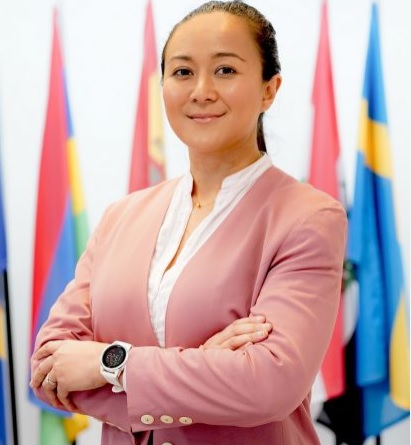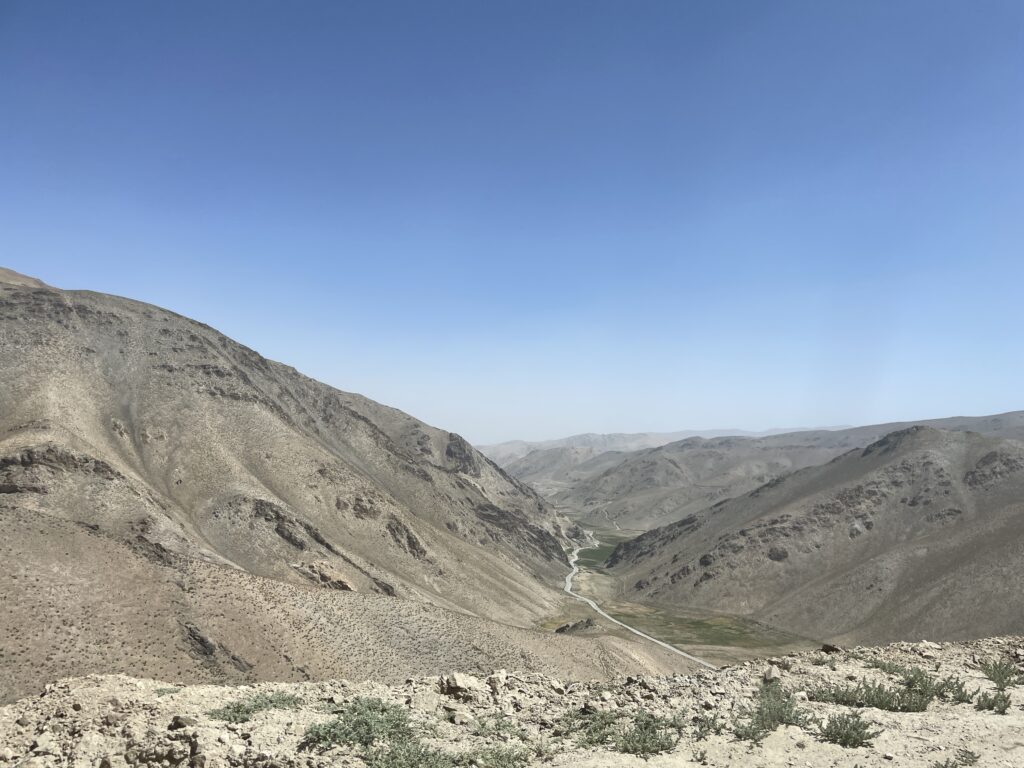Osmawani Binti Osman, external relations coordinator at Islamic Relief Worldwide, sheds light on Afghanistan’s little-discussed climate crisis in a blog written during a secondment to our Kabul office.

Having completed a month in Kabul already, I have better understanding of how rising temperatures are affecting the lives of Afghans. There were many things I did not know, climate-wise, about Afghanistan before coming here, especially the unique nature of its geography and how this adds to the country’s vulnerability to changes in the climate.
Lining the roadsides are small hand-pulled carts selling staples like onions, tomatoes and potatoes, as well as fruits such as peaches, cherries, mangoes, and the not-to-be-missed buckets of toot and shahtoot (varieties of mulberries), which are summer treats for Afghans.
This abundance of summer produce attests to the country’s reliance on agriculture – 80% of Afghans are directly or indirectly involved in farming and the agricultural sector makes up a quarter of the country’s GDP, according to the World Bank.
Therefore, it is alarming to learn that between 1950 and 2010 temperatures in Afghanistan rose by 1.8 degrees, which is twice the global average. Rising temperatures continue to affect both the climate and the lives of those reliant on the land to make their living. Temperatures in Kabul reached 36 degrees of late, compared to the annual average of 28 degrees.
Elsewhere, other parts of the country are still grappling with the drought that started in 2021, this time more severe and widespread than the devastating 2018 drought which caused a massive decline in wheat production. Wheat is a staple in Afghanistan and close to 300,000 people across the country’s north and west provinces were affected, many of whom left their homes in search of food.
While it may seem nonsensical amid these rising temperatures, Afghanistan also experienced its coldest winter on record. Indeed, heavy snowfall can be another effect of climate change. Rising temperatures evaporate more water into the atmosphere and this increased wetness turns into heavy snowfall in the Hindu Kush mountains or heavy rains in Afghanistan’s lowlands. Both the unusually hot summer and unusually cold winter show the broader impact of climate change, and the effects of which are being felt more frequently in Afghanistan than ever before.
Lack of investment
For a country ranked as the 8th most vulnerable to climate shocks, any changes in Afghanistan’s climate severely affect people’s lives.
It is especially hard on Afghans who rely on the land to sustain their livelihoods. In the past decade, Afghanistan’s humanitarian needs have been largely driven by conflict. However, in the 2 years since the Taliban took power the key drivers of humanitarian needs have become climate-induced disasters such as flash floods, torrential rains, snowfall and drought. As of May 2023, two-thirds of the population was considered acutely food insecure, meaning their lives or livelihoods were in immediate danger.

During my time in Kabul, one of the people I’ve met is Mohammad, whose house sits beside the Paghman River at the foot of the Hindu Kush mountain range, west of Kabul. Mohammad used to own a house in Paghman, but it was destroyed by flash floods a few years ago and he had to seek temporary shelter elsewhere. While he has now moved back to Paghman. The former stonemason’s only means of income is now the small fee he collects from helping people transport items to the nearby market using his wheelbarrow, and has not been able to save any money to repair his old house. He lives in a rented property and, as with others in the area, gets the water he needs from shallow wells. In the 4 years he’s lived there he mentioned having to dig the well deeper and deeper to get any water. “I have to dig 4 meters further, then 3 more meters and more recently a further 6 meters”, he said.
Groundwater relies on ‘recharge’ from snow melts in spring – but without proper investments in water management, this water is bound to permeate deeper into the earth. Data on levels of Kabul’s groundwater was last captured in 2013 and it can be assumed that with the changing climate and Afghanistan’s low adaptation capabilities, its levels will continue to decline, worsening the situation for millions of Afghans like Mohammad.
Immediate action needed
The devastating impacts of climate change on Afghanistan rarely make headlines. The international community is focused on the policy of current authorities and protection issues, particularly the rights of women and girls. Assistance is currently limited to alleviating only the most pressing humanitarian needs.
Climate change sits somewhere in the middle – between urgent humanitarian needs and Afghanistan’s development challenges in the long term. Two years since the Taliban took control, helping the country adapt to the changing climate could be a way to move beyond just providing emergency assistance.
Afghans desperately need the international community’s help in adapting to climate change and in particular, improving their access to food and water. In fact, climate change is one of the few issues that the international community and the Taliban government actually agree on.

Afghanistan’s National Environmental Protection Agency (NEPA) has called for the resumption of over 30 environment projects worth more than $800 million (£611 million)– approved projects, some of which are already funded but were paused due to the political transition in 2021. According to NEPA, should these projects go ahead, they will help Afghans deal with climate change and open up employment opportunities. However, since climate change projects are categorised as development-related, the international community is reluctant to lend support, so as to not be seen as legitimising the de facto authorities.
Nevertheless, the effects of climate change cut across political boundaries. At a time when the lives of millions of Afghans are at stake, the international community should consider taking immediate action to mitigate the impact of climate change in Afghanistan before it’s too late.

Partnering with UNDP via the ABADEI initiative, Islamic Relief has helped rehabilitate more than 200 existing community-based irrigation systems in Bamyan, Balkh, Herat, Kunar and Kandahar, increasing irrigated land by 50%. As a result, around 200,000 farmers are now able to use their land more productively, seeing an increase of 59% of food produced in these areas. Islamic Relief has recently started implementing phase 2 of ABADEI and expects to see similar positive results.
Initiatives like ABADEI are supporting Afghans to adapt to some of the challenges of climate change, while building sustainable livelihoods. Please help us to continue this vital work. Donate now to our Afghanistan Emergency Appeal.










